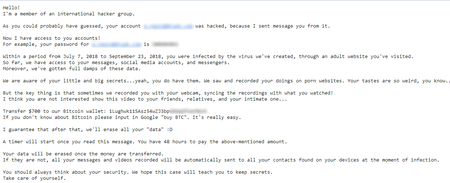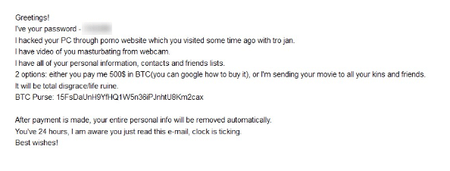Doctor Web analysts warn users about increase in fraudulent spam mailings
Real-time threat news | Hot news | All the news
October 26, 2018
Emails received by network users indicate that their email accounts were hacked and spyware was installed on their computers.
Threatening to distribute confidential information, cybercriminals extort a ransom amount in bitcoins that is equal to 700-1,500 USD. The victim has 48 hours to make a decision.
To back up what they are saying, the cybercriminals attach to the email a password from the user's account, and they specify the user's email address as the sender address.
Cybercriminals allegedly use public databases containing information about leaked logins and passwords to select their victims. Users who have experienced such fraud note that, in most cases, the received emails contained correct but outdated passwords, and some people report that they received several identical emails with passwords they used at different times.
At the moment, spam mailings are being detected in English and Russian. Emails in English can be written in good, literate English or using an electronic translator.
If you receive an email like this, don't fulfil the hackers' demands. Such emails are typical social-engineering techniques, and their aim is to provoke a user to perform injudicious actions.
To date, no information from the spam emails sent by cybercriminals has been confirmed—this allows us to consider this mailing to be fraudulent.
At the same time, some users found that their mail accounts were used for unauthorised mailings. This is presumably due to the fact that for many years, they have used the same passwords to access their email accounts and other resources, which allowed attackers to gain access to their accounts using compromised password databases.
Doctor Web recommends:
Run an anti-virus scan on your computer and mobile devices.
Change your passwords and do this regularly in the future.
Don't use the same access passwords for your insignificant resources and the places you store your personal data.
#fraudulent_email #fraud #spam

